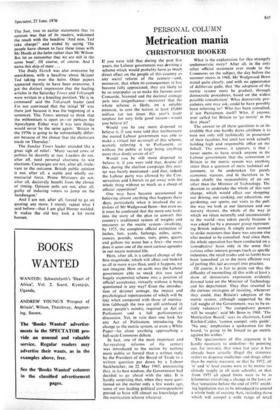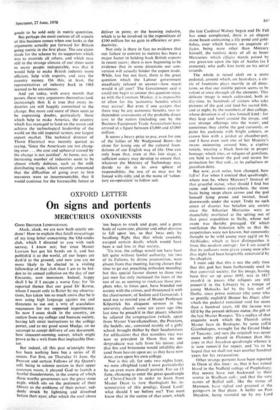PERSONAL COLUMN
Metrication mania
CHRISTOPHER BOOKER
If you were told that during the past five years, the Labour government was devising a scheme which would probably have as much direct effect on the people of this country as any social reform of the century—and, moreover, that when its consequences at last become fully appreciated, they are likely to be so unpopular as to make the furores over Concorde, Stansted and the decimal coinage pale into insignificance—moreover that the whole scheme is likely, on a reliable estimate, to cost the nation at least £5,000 million (or ten times this year's trade surplus) for very little good reason—would you believe it?
Would you be any more disposed to believe it, if you were told that furthermore the ousted Labour government was able to make a virtual fait accompli of this scheme. scarcely referring it to Parliament, or without the public at large being anything more than dimly aware of it?
Would you be still more disposed to believe it. if you were told that, despite all this, during the election campaign this mat- ter was barely mentioned—and that, indeed, the Labour party was allowed by the Con- servatives and Liberals to get away with the whole thing without so much as a cheep of official opposition?
One may have become accustomed to believing almost anything that happens these days, particularly when it involved the ac- tivities of Mr Wedgwood Benn—but even so, it must be confessed that the more one looks into the story of the plan to convert this country's traditional system of weights and measures to the metric system—involving, by 1975. the complete official extinction of inches, feet, yards, furlongs, miles, acres, ounces. pounds, stones, tons, pints, quarts and gallons (to name but a few)—the more does it seem one of the most curious episodes in our recent national life.
Here, after all, is a cultural change of the first magnitude, which will affect and bedevil us all in more ways than, until it happens, we can imagine. How on earth was the Labour government able to sneak this vast (and hugely expensive) scheme into a position of official acceptance, virtually without it being questioned in any way? Even the introduc- tion of decimal coinage, the impact and psychological repercussions of which will be tiny when compared with those of metrica- tion (although the two are still confused in many people's minds), required, an Act of Parliament and a full parliamentary discussion. Yet, in vain does one look for any Act of Parliament introducing the change to the metric system, or even a White Paper—let alone anything approaching a full-scale Commons debate.
In fact, one of the most important and far-reaching reforms of the century was introduced to the nation by nothing more public or formal than a written reply by the President of the Board of Trade to a written question put down by a Labour backbencher, on 22 May 1965, announcing that, in its best wisdom, the Government had decided to go ahead with the idea. It is hardly surprising that, when they were ques- tioned on the matter only a few weeks ago, some of our leading political correspondents proved to have still almost no knowledge of the metrication scheme whatever. What is the explanation for this strangely undemocratic story? After all, in the only other 'official statement ever made to the Commons on the subject, the day before the summer recess in 1968, Mr Wedgwood Benn stated quite clearly, and with no appearance of deliberate guile, that 'the adoption of the metric system must be gradual, through democratic procedures, based on the widest possible consultation'. What democratic pro- cedures, one may ask, could he have possibly been referring to? Who has been consulted, if not Parliament itself? Who, if anyone, ever called for Britain to `go metric' in the first place?
The answer to all these questions is so in- credible that one hardly dares attribute it to men not only still technically in possession of their faculties, but until last week actual!) holding high and responsible office on our behalf. The answer, it appears, is that never seems to have struck anyone in the Labour government that the conversion ol Britain to the metric system was anythini other than a question of mere technical ad- justment. to be undertaken for pure!) economic reasons, and fit therefore to be made chiefly the responsibility of no one other than the Minister of Technology. The decision to undertake the whole of this vast change, which would affect our shopping our driving, our cooking, our education, our gardening, our sports, our visits to the pub. the way we look at our literature and our nursery rhymes, the whole of the way in which we relate naturally and unconsciously to the world—was taken purely because it was asked for by a pressure group represent- ing British industry. It simply never seemed to strike ministers that there was anyone else who needed to be consulted. And since then, the whole operation has been conducted on a 'consultative' basis only in the sense that various other interest groups (such as specific industries, the retail trades and so forth) have been 'consulted' as to the most efficient way of putting this fail accompli into practice.
Of course, it is fair to point out that the difficulty of reconciling all this with at least a show of democratic expression evidently dawned later on the Minister of Technology and his department. They thus resorted to the curious stratagem of insisting, whenever they could, that Britain's adoption of the metric system, although supported by the full weight of the Government. was to be en- tirely voluntary! 'No compulsory powers will be sought', said Mr Benn in 1968. 'The Metrication Board,' says its chairman, Lord Ritchie-Calder, 'cannot compel, only guide'. 'No one,' emphasises a spokesman for the board, 'is going to be forced to go metric against his wishes.'
The speciousness of this argument it is hardly necessary to underline—by pointing out, for instance, that since last year it has already been actually illegal (by statutory order) to dispense medicines and drugs other than by metric measure, or that by 1972, all 'o' and 'A' level exams were to be metric (as already taught in all state schools), or that from 1973 all speed limits were to be in kilometres (involving a change in the law), or that 'sometime before the end of 1971' enabl- ing legislation was to be introdu,ced to amend a whole body of existing Acts, including those which will compel a wide range of retail
goods to be sold only in metric quantities.
But perhaps the most curious of all aspects of this business comes when one looks at the arguments actually put forward for Britain going metric in the first place. The one claim made for the scheme by its supporters which was to override all others, and which may still in the strange climate of our times seem to many people indisputable, was that it would help to make British industry more efficient, help with exports, and save the country money. On this, at least, the representatives of industry back in 1965 seemed to be unanimous.
And yet today, with every month that passes, these very arguments themselves look increasingly thin. It is true that many in- dustries are still happily committed to the change. But more and more of them seem to be expressing doubts, particularly those which help to make America, the country which has managed to land on the moon and achieve the technological leadership of the world on the old imperial system, our largest export market. The technical director of Thorn Electrical was recently quoted as saying, 'Since the Americans are not chang- ing over ... the cost and upheaval caused by the change is not justified'. At home, too. an increasing number of industries seem to be almost wholly dubious, such as the milk distributing trade, which recently announced that the difficulties of goirig over to litre measures were so insurmountable, that it would continue for the foreseeable future to deliver in pints; or the brewing industry, which is to be involved in the expenditure of £100 million for no gain in efficiency or pro- ductivity.
Not only is there in fact no evidence that our failure to convert to metrics has been a major factor in holding back British exports in recent years:. there is now beginning to be evidence that in some directions our con- version will actually hinder the export trade. While, last but not least, there is the great question which the Labour government steadfastly refused to answer—how much would it all cost? The Government said it could not begin to answer this question since. akwith the Common Market, it is impossible to allow for the 'economic benefits which may accrue'. But even if one accepts that there may be any economic benefits, two in- dependent assessments of the probable direct cost to the nation (including one by the Business Equipment Trade Association) have arrived at a figure between £3,000 and £5,000 million.
It seems a heavy price to pay, even for one of the follies of Mr Wedgwood Benn—let alone for losing one of the cultural foun- dations of our English way of life. One can only hope that, even at this late stage, a sufficient outcry may develop to ensure that, whatever the Ministry of Technology may decide to do in its own sphere of responsibility, the rest of us may not be forced willy-nilly and in the name of 'volun- tary co-operation' to follow suit.































 Previous page
Previous page